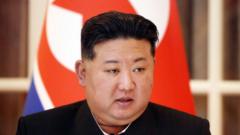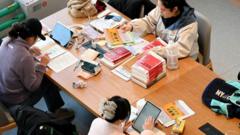Veteran writer Han Song blends fiction with the stark realities of a rapidly evolving China, drawing on his career as a journalist and his imaginative storytelling prowess to address pressing contemporary themes.
The Imagination of Han Song: A Journey Through China's Transformation

The Imagination of Han Song: A Journey Through China's Transformation
Explore the profound insights of Han Song, a prominent Chinese science fiction writer who captures the paradoxes of modernization and its unexpected consequences.
In an era where reality often eclipses fiction, Han Song, one of China’s prominent science fiction writers, reflects on the surreal convergence of the two. As a journalist for a state news agency, Han documents his nation’s rapid modernization by day, but it’s at night when his fictional narratives take shape, exploring the bizarre and unsettling aspects of modern life.
His earlier works have eerily forecasted significant global events; notably, Han’s 2000 novel chillingly chronicled the collapse of the World Trade Center. Fast forward to 2016, and another of his stories envisioned a world transformed into an expansive hospital, a haunting precursor to the pandemic lockdowns that swept across China and the world.
“At the time, I thought my depictions were exaggerations,” Han states, referencing his work “Hospital,” where society’s members devolved into mere patients. “Yet, mere years later, these narratives reflected our painful reality,” he mused. "This showcases how life can often feel more like science fiction than the fiction itself.”
For four decades, Han has navigated the complexities of life in a rapidly changing China through his dark and grotesque stories. His writings venture into poignant territories, juxtaposing ordinary settings against scenes of stark brutality or surrealism. In one of his notable short stories, “The Passengers and the Creator,” Han critiques the idolization of Western technology, weaving a narrative in which the characters worship a god named Boeing.
The stark contrasts between China and the West serve as recurring themes in his work, stimulating reflection on power dynamics in a world where China appears poised to eclipse the United States as the foremost global power. Ordinary life in subway trains morphs into realms of the grotesque where cannibalism or hedonism reigns, compelling readers to confront the disconcerting possibilities of their future.
As Han Song continues to chronicle life amidst these transformative times, his role as both journalist and storyteller provides a unique lens through which the intricacies and implications of modern existence are revealed, making him a crucial voice in contemporary literature.






















